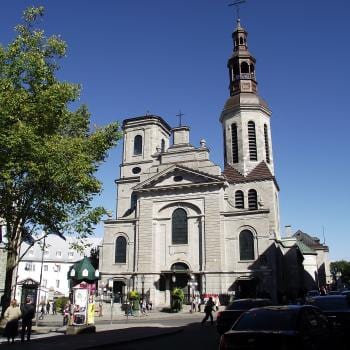The objections to the news that Turkey plans to use Hagia Sophia as a mosque has upset many Christians in the East and the West, going all the way up to Pope Francis.
Here is a good summary of reactions among Protestants, Roman Catholics, and Eastern Orthodox:
The World Council of Churches (WCC), a community of churches seeking unity in the Christian faith, whose members include over 350 churches across from across the globe, expressed hope that Hagia Sophia would be restored to the “emblematic unifying role” it has served since 1934. The WCC’s member churches include mainline Protestant denominations such as the United Methodist Church, the Evangelical Lutheran Church in America, The Episcopal Church, the Presbyterian Church (USA), the Christian Church (Disciples of Christ), and the United Church of Christ.
Rev. Prof. Dr. Ioan Sauca, the interim head of the WCC and the first Orthodox Christian to hold the role (Sauca belongs to the Orthodox Church in Romania), expressed “grief and dismay” on behalf of the WCC in a public letter sent to President Erdogan. Not mincing words, he stated that “By deciding to convert the Hagia Sophia back to a mosque you have reversed that positive sign of Turkey’s openness and changed it to a sign of exclusion and division.”
Elizabeth Eaton, Presiding Bishop of the Evangelical Lutheran Church in America (ELCA) wrote, “As a church, we join with our Christian family and our Muslim neighbors in calling for the Hagia Sophia to remain a museum. Turning it back into a mosque is not only a return to divisive history but an erasure of a living religious and spiritual expression.”
…The leader of the Greek Orthodox Archdiocese of America, Archbishop Elpidophoros, implored believers to take action and to speak to Christian neighbors and friends, as well as to their elected leaders, who he hopes will act “to protest by every means possible.” He added that the Hagia Sophia “should be allowed to retain its status quo as a place of encounter for Christians and Muslims, and for all people who desire to behold how faith in God can transform the world.”
Evangelical Protestants don’t seem to have much of a stake in the decision judging by reports at Christianity Today which do not feature born-again reactions.
The Christian response is odd — maybe even Trumpian (read bigoted) if anyone can remember all the grief POTUS took for banning travel from Muslim countries. The reason is that recent history of Hagia Sophia pits secularism against religion. As Dan Moran at Juicy Ecumenism (linked above) explains:
The massive, breathtaking cathedral was built in Constantinople (now Istanbul, Turkey) in the 6th century during the reign of Byzantine emperor Justinian I. It served as the center of the Eastern Orthodox Church for a millennium until 1453, when Sultan Mehmed II converted it to a mosque after the Ottoman conquest of Constantinople. In 1935, President Kemal Atatürk, the father of modern secular Turkey, officially re-opened it as a museum after nearly 500 years of Muslim worship there.
Erdogan’s decision to reclassify Hagia Sophia as a mosque came just hours after Turkey’s high administrative court annulled the 1934 decision that turned the site into a museum. Within the country, the move is a highly popular one with the president’s nationalist and conservative base, who have long wanted to hold prayers at Hagia Sophia, but only raises tensions with Turks who desire a more secular, pluralist state.
So it was a cathedral (Christian), then became a mosque (Muslim), and then a museum (secular). In fact, Ataturk’s effort to make Turkey into a secular republic was much more anti-clerical than it was imam-friendly since part of his inspiration for secular government came from the anti-clerical French Revolution. Someone might think that Christians who worry about the ever growing presence of secularism in politics and the hostility of governments to people of faith might see the return of Hagia Sophia to religious purposes as a welcome development. They might even remember that Istanbul’s Blue Mosque, a magnificent space still used for prayers (and more), is one of the sites on Unesco’s list of masterpieces worthy of preservation and historic significance. The Suleymaniye Mosque, which dates from the sixteenth century, is a regular stop for tourists in Istanbul even though it still functions as a religious space. If Hagia Sophia reverts to a mosque, that change will not necessarily prevent it from being a place that unites peoples (with cameras and umbrellas) from around the world. It will mean they will need to take off their shoes.
Many view Turkey as an ally of anti-Christian persecution in the Middle East, including this Australian Presbyterian:
I suspect that turning the Hagia Sofia into a mosque will only make things worse as it will encourage the more radical Islamists to fulfil their dream of a society where Sharia law is fully enacted, and the Christians and secularists are removed. Another Hagia Sophia in Nicaea, where the Second Council of Nicaea was held in 787, has already been turned into a mosque. It is a concerning development which raises a number of questions.
This may explain Cardinal Dolan, Archbishop of New York’s statement:
The Hagia Sophia was for nearly a millennium not only the greatest Church in the world, but the greatest edifice as well. Its purpose was to be a place of Christian worship par excellence. When the Roman Empire came to a conclusion by conquest, and the Great Church was converted into a mosque, this was an era when human events were advanced through violence. But this is not the way we live today.
The creation of the modern State of Turkey is synonymous with a secular ideal of inclusivity. By changing the status of Hagia Sophia from a mosque to a museum, President Atatürk manifested this global monument to be a sign of transition from a theocratic empire, to a secular state that valued the equality of all its citizens.
We affirm the wisdom of this earlier decision, and call for a reversal of the current policy of the Turkish government to change the status of Hagia Sophia. We stand together as brothers in faith, and in solidarity with all people of good will and good faith, so that Hagia Sophia may remain what She is – a symbol of encounter, history, spiritual aspiration, and human achievement of the highest order, glorifying the One God Who has made us all to be sisters and brothers of one human family.
Surely, what can be stranger than Christians standing in solidarity with secularist “people of good will and good faith” such as Ataturk? Just as odd is hearing a pastor and bishop praising a museum as a better use of space for religious purposes than a mosque where people actually pray. If secular liberalism is really the threat that Christians have been saying it is for the last thirty-five years, the use of Hagia Sophia for religious services should be welcome news.












